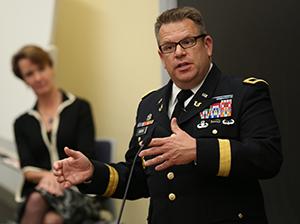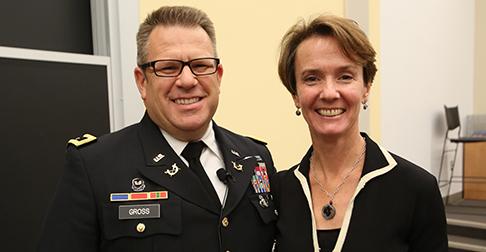Highest-Ranking U.S. Military Operational Lawyer Discusses Civilian Casualties
New York, October 10, 2014—The U.S. military is constantly revising its policy standards and training to ensure that civilian casualties are limited in combat zones, according to Brigadier General Richard C. Gross, legal counsel to the chairman of the Joint Chiefs of Staff, during a Sept. 24 visit to Columbia Law School.
“Unfortunately, we do have civilian casualties [in armed conflict],” said Gross, whose discussion was co-sponsored by the Human Rights Institute (HRI), the Roger Hertog Program on Law and National Security, and the Milbank, Tweed, Hadley & McCloy Faculty Student Intellectual Life Series. “We have to have a mechanism to learn from that, to get better from that, and to prevent those if at all possible.”
| Brigadier General Richard C. Gross, the highest-ranking uniformed operational lawyer in the U.S., addresses students. |
In his role as legal counsel to the chairman of the Joint Chiefs of Staff, Gross is the highest-ranking uniformed operational lawyer in the United States. He advises the country’s highest-ranking military officer, General Martin E. Dempsey, who, in turn, advises the president, the secretary of defense, and the National Security Council.
During his discussion, Gross said receiving timely and accurate reports of civilian casualties is a challenge, as is ensuring that independent investigative teams have the access and protection necessary to complete their work in combat zones.
Gross said the military emphasizes pre-deployment training as a way to mitigate mistakes or misconduct that can lead to civilian injury or death. Soldiers learn how to respond appropriately to various scenarios in role-play exercises.
“The best way to train folks is not a PowerPoint presentation,” Gross said. “That’s probably the worst way to train soldiers, sailors, marines, and airmen on the rules of engagement.”
During a Q&A session following his discussion, Gross fielded questions from students on topics ranging from the use of drones and new weapons technology to whistleblower protections. In response to one question, he also addressed compensation for civilians injured or killed in armed conflict. Gross explained that while compensation is important, existing U.S. law is not well designed to address claims in modern conflicts. He said the military has had to adapt by creating discretionary compensation regimes.
Columbia Law School professor and HRI co-director Sarah H. Cleveland introduced the general at the event. Gross and Cleveland are collaborating on a project to develop the law of non-international armed conflict. Cleveland co-chairs the Project on Harmonizing Standards for Armed Conflict while Gross serves on the steering committee.
In addition to the noontime lecture, Gross guest lectured in Cleveland’s class on International Lawyering for Governments (co-taught with Visiting Professor Daniel Bethlehem). He also met with students from the Human Rights Clinic and several military attorneys pursuing LL.M degrees at Columbia Law School.
Gross, a graduate of the United States Military Academy and the University of Virginia School of Law, has served in the Army for nearly 30 years. During that time, he was the chief legal adviser at the Joint Special Operations Command, the International Security Assistance Force, and U.S. Central Command, among other posts. He has also served during multiple deployments to Iraq and Afghanistan.
| Brigadier General Gross with Professor Sarah Cleveland, co-director of the Human Rights Institute. |

